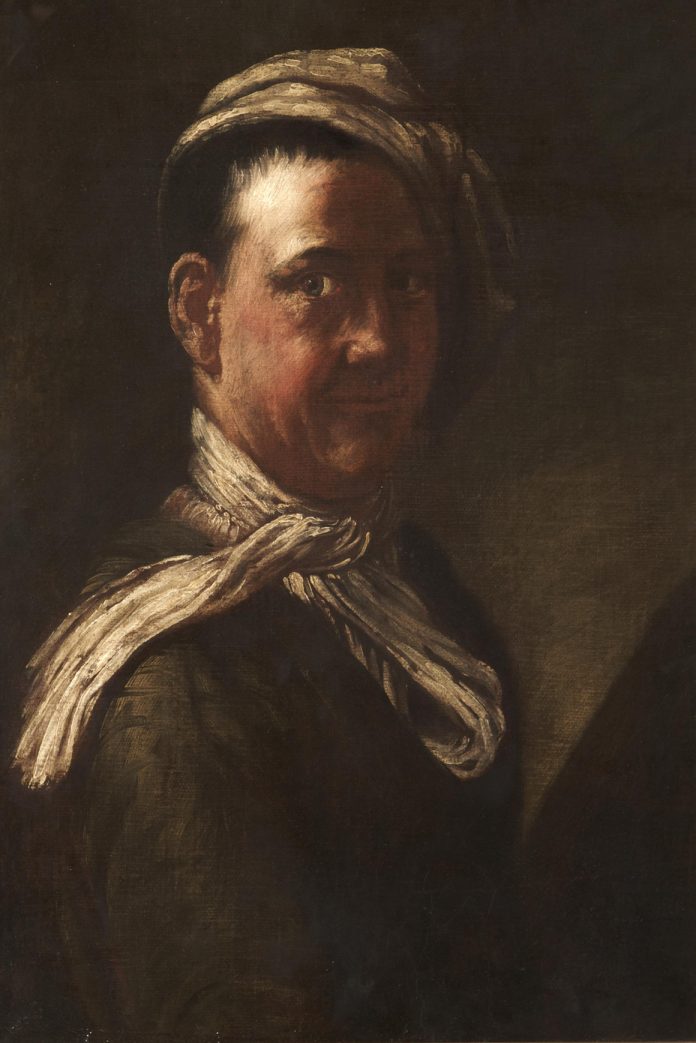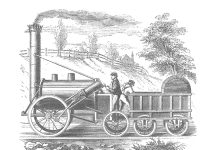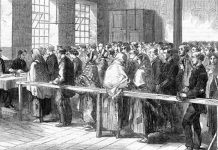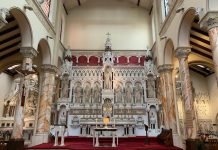Separated by two centuries, yet events pulsing from the same vein of civil disobedience, a food riot in 18th century Manchester and the student uprisings in Paris in 1968 are drawn together in new work by Magnus Quaife for a new exhibition, While England Mourns at Touchstones, Rochdale, open between Fri 4 May – Sat 30 June 2018.
In the 50th anniversary of the protests in the French capital, and during a time of sustained global insecurity and political drama, Quaife takes a long-range view of the iconic imagery of Atelier Populare, setting their incisive sloganeering alongside the satire of Tim Bobbin, a self-taught, Lancastrian satirist and painter who set politics alight two hundred years prior.
A series of ‘paintings’ repeat a defining slogan from the press of the Parisian protest movement, La Beauté Est Dans La Rue (Beauty Is In The Street), represented on sheets of industrial-grade PIR (polyisocyanurate) insulation board.
Each slogan is reproduced in near-faithful likeness to the original by painstakingly peeling the external layer of foil from the board, yet the approach destroys the structural integrity of the boards forcing them split and warp.
In doing so, Quaife develops striking contrast between the perceived glamour of the images connected with Paris ‘68, famously produced in the occupied print room of Ecole des Beaux Arts, and more functional, proletariat reality.
Quaife’s careful material choice presents artwork that nominally ‘insulates’ the gallery itself, suggesting the possibility of painting finding a new kind of usefulness and goading the viewer to look elsewhere for an aesthetic fix.
ATELIER POPULARE: “The posters produced by the ATELIER POPULAIRE are weapons in the service of the struggle and are an inseparable part of it. Their rightful place is in the centers of conflict, that is to say, in the streets and on the walls of the factories. To use them for decorative purposes, to display them in bourgeois places of culture or to consider them as objects of aesthetic interest is to impair both their function and their effect.”
Quaife uses While England Mourns to connect Parisian unrest with Lancastrian heritage and return the oft-forgotten Milnrow school master John Collier, known by the pseudonym, Tim Bobbin, to public consciousness. At first glance the two worlds are wildly disparate, yet Quaife convincingly forges links between the deceptive simplicity of Collier and the Paris students’ shared visual language, their poetry and pointed political critique.
Alongside the artist’s specially-commissioned pieces, Touchstones will show pages from Bobbin’s poem, While England Mourns, from which the title of the show is taken, a savage reading of political greed and corruption of the upper ruling elite, alongside its accompanying illustration.
Three portrait busts of Bobbin will be set on bricks from the gallery’s own social history collection, the material choice again dissolving stylistic enquiry in favour of function, as well as making clear reference to dissent, protest and violent uprisings with bricks being the time-honoured ‘weapon of choice’ for the, otherwise unarmed protagonist.
Born in Urmston and buried after his death in St Chads, Rochdale, Bobbin was a self-anointed ‘Hogarth of the North’, working tirelessly and precociously as a self-tutored writer, painter and caricaturist to record the darker side of provincial life in the 18th century, all in a distinct Lancastrian dialect.
His satire cut down the corrupt political figures and pompous ‘celebrities’ of the day and captured fractious social events on paper, including ‘the Shudehill Fight’ in central Manchester during November 1757, as food shortages forced the local population to riot against an emergent, merchant upper class. A collection of his caricatures were published in 1773 in a book titled ‘Human Passions Delineated’, which was a best-seller of the period.







